A GARMENT SELLER
By Surojit
Sunil Kumar is a resident of Bowbazar. After having studied till standard viii, he had to leave studies due to problems at home. He is now 24 years old. He has a fair complexion and he loves wearing topis. He sells clothes underneath the Sealdah overbridge. At home he has his parents and two sisters. He shoulders the responsibility for each of them. He earns about Rs. 70/- daily, and about Rs. 2500/- per month. This does not suffice at all. There are the tution costs of his sisters as well. Since he could not complete his education, he hasn’t been able to land a better job. He hopes that his sister will stand beside and support her parents when she becomes independent.
photographs by Surojit
A GROCER
By Tapas
Beside the Shoni mandir in Bowbazar, there is a grocery store run by Rajesh Shau. The shop has a very good sale. In the adjacent store, because the supply of spices and other items was limited, the shopkeeper has installed a Lotto machine. This has resulted in the sales of items going up in this store. This machine can be found in a single grocery shop in the locality. Nearby there is a wheeler selling chhatu and a shop selling kachoris. To the left of the grocery store there is a jeweller’s store. This shop is called Bongolokkhi after the name of the shopkeeper. The shopkeeper passed away owing to high sugar problems. After his death, his wife sits in the shop near the cash box, looking after the finances.
photographs by Tapos
A DOMESTIC HELPER
By Pinky Lal
In the Bowbazar locality in Kolkata, 7-8 women from the Uriya bari in Maathgoli work as domestic help. I am writing about a girl who lives in the 4th floor of the same building. She was widowed 22 years back. Her father is no more. She works in other people’s homes. Since she was very talkative, her parents had named her Buli. Her proper name, however, is Aroti. She does not believe in any caste barrier, but she believes in God. Her life has faced the onslaught of a storm of cyclonic proportions. Previously they used to live in their country home. Her father was called Balaram Maity. He had bought space in Uriya Bari.
Buli is fair, and she has had some education. When she was 20 years old, her parents found a groom for her. The boy had an office job. He was a good person, and lived in Kolkata city. Apart from his parents, he had a smaller brother at home. One month after Buli got married, his family members conspired against him and killed him. Buli did not frame a case against them. After her husband’s death, her in-laws married her off with her brother-in-law. As a result, the latter got his late brother’s job. After some time, her in-laws sent Buli off to her home for a while and in the meantime, confiscated all her jewellery and ran off. Buli returned to find that the landlord had locked up the place. She realized that she had been cheated. Returning home, she began to look for jobs. She met someone who put her in touch with some households which needed domestic help. The same man cheated her out of the little remaining jewellery she possessed. Buli had entrusted her jewellery to him, and he never came back. Her family refused to believe her story. Gradually Buli came to lose her trust in people. She started to work in a household and has been doing so for the last 20 years. She supported her aged parents with her income. Till date there has been no news of her in laws. In 2007 her father passed away during the Rather mela festival. She doesn’t know whether her first husband’s brother, i.e. her second husband, is alive or not, but she considers herself a widow anyway.
She is now 42 years old. She is now considering moving to Bombay to work as domestic help, since she knows she can earn much better there. On the other hand, she thinks of the comparably high room rents in Bombay. The rooms have beds in two tiers there. If one takes the upper bunk, the cost is Rs.1450/-on a monthly basis whereas the lower bunk costs Rs. 1300/-. So Buli decided to opt for the lower bunk. There were people who used to call her “jhi” (a commonly used term for domestic help) while others treated her as one of their own. Working in other people’s homes is considered respectworthy by some and unrespectworthy by others. Even after undergoing such a lot of struggle in life, the fact that Buli is still honestly earning her living, that itself is commendable.
A FISH SELLER
By Tania Mondol
In our locality, there are many livelihoods. One of this is that of a fishseller. The person I am talking of is called Tapa De. He lives in 18, Madan Dutta Lane. There is a beautiful Shiv temple adjacent to his home.
Tapa is doing this business ever since childhood. Every day he leaves home for work in the morning and returns in the afternoon. Apart from this, he also works in an external catering business. He has had some level of education. Even with his education, he was forced to take up this job because he had to take up the responsibility of his parents, a younger brother, an older sister and her ailing son. So, without wasting much thought, he had gotten down to this work. In the beginnings he used to work under other people, but later started off his own business in a small way. His business did well. Neighbouring people are of the opinion that this work of Tapa is a respectworthy thing to do. Everyone respects Tapa as one deserving of respect. He has been doing this work for 10-12 years now. Now his family consists of his wife and daughter apart from his brother, sister and her son. His mother has passed away. He finances his brother’s education. He can be called quite well off now. He sells varieties of fish in the Bowbazar area, and earns enough to be able to meet the demands of an ordinary life.
AN ELECTRICIAN
By Robi Mondol
I live in 18/1 Premchand Boral Street. In my locality I know someone who does good work as an electrician. His name is Kinkar Mondol. He has grown up in this para only. His childhood was one of struggle, yet he was able to continue his education through all the travails he faced. He visits different homes and takes orders. He has been on this job for the last 17 years. The para people are fond of him and respect his work. He gets orders from different places outside Kolkata as well. His family consists of his elder brother, his wife, his daughter and son.
A GOLD SELLAR
By Jyotsna Das
I am Jyotsna Das. I reside in a small bustee in Bowbazaar. There are people with different livelihoods living in our para. From them, I chose to write on someone who is a seller of gold ornaments. His name is Prodip Roy. He lives in a place called Nimta in Belghoria. His family consists of mother, sister, brother, sister-in-law, niece, and his wife. I have heard from him that he along with his siblings had a struggle-filled childhood. Previously they used to live in Bangladesh. There, when fights broke out, they fled and came here, and it was then that his father fell ill and passed away. They managed to make their way to Kolkata. Here they put up at his mother’s parents’ place. His mother used to work as domestic help, and in this way she earned money for their education. She could not give them a lot of education however. They had to leave studies because of lack of money. They started to learn gold work from their maternal uncle. This was their family business. Now he has mastered this work. He has his shop where he works on orders sourced from different showrooms. Many people now learn gold work under him. His workspace is not his own, it has been taken on rent. He likes his work. When one enters Bowbazaar, one sees long lines of ornament shops. In a way then, Prodip’s work has a role in the very identity of Bowbazaar. Something he remembers about his work. One day while going home he lost some gold he was carrying with him. Somebody from the neighbourhood found it and returned it to him. He will remember this day.
A SHOEMAKER
By Rahul Goswami
Today’s writeup is about a man who lives in a room just adjacent to the public lavatory squashed in a dirty corner of Napitbagan Bustee. Musha da is a shoemaker. He is not a bit ashamed about this identity. He belongs to a lower middle class Muslim family. Now he is 32 years old. He has lived in my para for more than 21 years. Previously his father used to do leatherwork, and Musha da learnt the ropes of making and repairing shoes from his dad. He used to live with his mother in a village ancestral home. His village was Panchloki in Diamond Harbour, Palta. After his mother’s death, his father brought him to Napitbagan bustee in Bowbazaar, and instead of books, put leather and tools of shoemaking in his hands. From then on, Musha da has made his life as tough as leather. When I went to interview him, Musha da initially thought I had come to make fun of his work. But then, when I explained my projects to him, he said, “I had thought, Babu, that you had come to poke fun at my work. Now that I understand your reasons, I don’t feel that it is important to write about my work.” I was surprised by Musha da’s words. That a shoemaker from the lower orders could become the subject of anyone’s writing was unbelievable to both Musha da and his wife. I had only one thing to say to him, that to me Musha da was a good designer, since he thought up new ideas and created new shoe designs using his creative mind.
I talked to some shoemakers around as well. All of them said that shoemakers do not have a good name. They added that their state was very bad. Their parents usually live in their country homes. But Musha da doesn’t have anybody except for the refuge of his wife. Musha da’s 3-4 year old daughter died in an unfortunate incident. Nobody perhaps remembers her face. Musha da is a quiet person. His black, wide body at work does not give a clue to the pain within. His room is like a dark, claustrophobic pigeon-hole. Musha da himself does not recall what colour the walls of the room had been. It is a 6 foot by 4 foot room. There is no bed, but a chatai and pillows are laid out on the floor. The walls are nearly covered by hanging heaps of saris and other clothes. There is no separate space for cooking, the lavatory has been curtained off to create a small kitchen. There is no window in the room, not even one as small as a mirror. The smell of the room is a peculiar medley of leather smells, the smell of cream shoe polish and dampness. Though it is not apparent from outside, once you enter the room you feel that it has ended even before it has begun.
Though Musha da is a quiet person, he is very efficient about finishing work. He gets up at 6.30 in the morning, finishes his bath and doesn’t ever miss his namaz. After that he leaves home with his tools and doesn’t return before 2 o’clock in the afternoon. He will sit outside his room till evening and repair shoes. About 7 o’clock, he goes off to the chora bazaar and sits there with his handmade shoes till 12 in the night in the hope of selling them. Musha da’s wife wasn’t able to answer my questions to satisfaction. The reason may have been hesitancy or ignorance. But she volunteered the information that Musha da has never abused her in a drunken fit. She also pointed out a good habit that Musha da has: Whenever he gets a good sum of money, he saves half of it and spends the rest in purchasing things needed at home. When the interview was drawing to a close, Musha da asked me to purchase a pair of shoes from him. I told him that I would drop in at the next discount sale. When I was leaving we mutually said “Allah Hafiz” to each other. Whoever is sitting there above us, may his good gaze be upon Musha da, on his little room by the public lavatory, and on his work.
A SEX WORKER, JYOTSNA
By Anjali
Jyotsna was born in a village in Murshidabad. She was born after two children. Her name suits her looks. Her father used to work in the fields. They were very poor, so they couldn’t educate her two brothers. Jyotsna had, however, studied upto class 2. She did not enjoy studying, and therefore left it. When she was 11-12 years old, she was married off in a social ceremony. Her puberty started 3-4 months after her marriage. Her husband used to live in an adjoining village. He used to visit Jyotsna’s home sometimes. It was kind of love at first site for him. Her in-laws did not much like her. Her father-in-law had passed away. Her husband had a passion for football. Her life was smooth at this juncture. After some time, she gave birth to a bay daughter. Two and a half years after marriage her husband had an accident. During a game of football, the ball hit his genitals. This resulted in bleeding during intercourse. Jyotsna forbade him to indulge in such painful sex, but he did not listen to her. If she did not want to have intercourse in such painful circumstances, her husband used to get angry, and gradually this turned top suspicion. He began to suspect that she might be having an affair. Jyotsna tried her best to convince him that this was not true but he was not convinced. Hardly 7 months after the football accident, her husband committed suicide by consuming poison. Her in-laws alleged that it was because of her that he had died, and sent her back to her father’s house. Here also there were problems waiting for her. Her brother hardly looked after his parents, leave alone having the inclination to look after his sister and niece. He was busy with his own wife and children. Gradually she felt she was becoming a burden to her father’s family. Though she earned some money, it was barely sufficient to feed or educate her daughter. As she was a widow, no one in the village was likely to marry her at this point.
Jyotsna’s maternal uncle’s daughter was a sex worker. Jyotsna knew about the red light areas of Bowbazaar, Shonagachhi and Amtala. One day she also was compelled to enter this profession, for the sake of her daughter. This was because one could earn a lot from this livelihood, which she could use to make her daughter’s future beautiful. Jyotsna came over to Bowbazaar with her maternal cousin, leaving her daughter back at home with her mother. She informed her mother only that she had become a sex worker, but her brother and sister-in-law also came to know this and stopped communicating with her on this account. Nowadays, she sends money home every two months. This money supports her daughter and her parents. She is doing this work for 1 year 3 months now. Her maternal cousin is now no longer a sex worker in Bowbazaar, she has gotten promoted to a malkin (pimp). She has many girls working for her. Jyotsna and some other girls live together in a small room. She does this workm regularly now. Everyday she burns herself, allowing herself to be torn apart by some jackals. She tolerates this only thinking of her daughter. She does not want to do this work any more. But there is no other way now, because once a person has fallen into this fire, she has no option but to get burnt. In the eyes of society, Jyotsna is a “bad” woman now. But if society ever asked why she had chosen this path, then it would not perhaps have seen her in this perspective. This self sacrifice is for her daughter only.
AN AYAH
By Supriya
Her name is Sheela Mondol. She is an ayah, looking after sick people in the Medical College hospital. She works both in day and night shifts. She cooks in the morning if it is a night shift. In the case of a day shift, either of her two daughters takes a day off from school and does the housework. Her husband, Shankar, is an electrician. She has two daughters and a son. Her elder daughter is Purnima, she is in class 11. The younger is Shampa, she is in class 8. Her son is called Bikram, he studies in class 2. The families of the patient pay her ten rupees as bakshish apart from her standard wages as an ayah. She has been doing this work for 8 years now. The financial condition of her family is more or less comfortable presently.
Their original home was in Jomu, but as of now they are based in Kolkata. Here they had two small rooms to stay in. The dividing wall between these two small rooms has now been broken down to form a larger space. They have a pump at home, so they don’t face any water crisis. They had kept birds as pet before, now they have been sold off. They have a bed inside the room, as well as one outside. Outside the room they have some flowers in pots, which they have kept attached with the wall. In front of the room there is also a small temple. They offer the flowers blooming in the pots to the deities in the temple. Beside the temple there is a mansa tree. During Shiva ratri, everyone fasts and offers puja. Apart from this, one of her two daughters or her son offer puja daily.

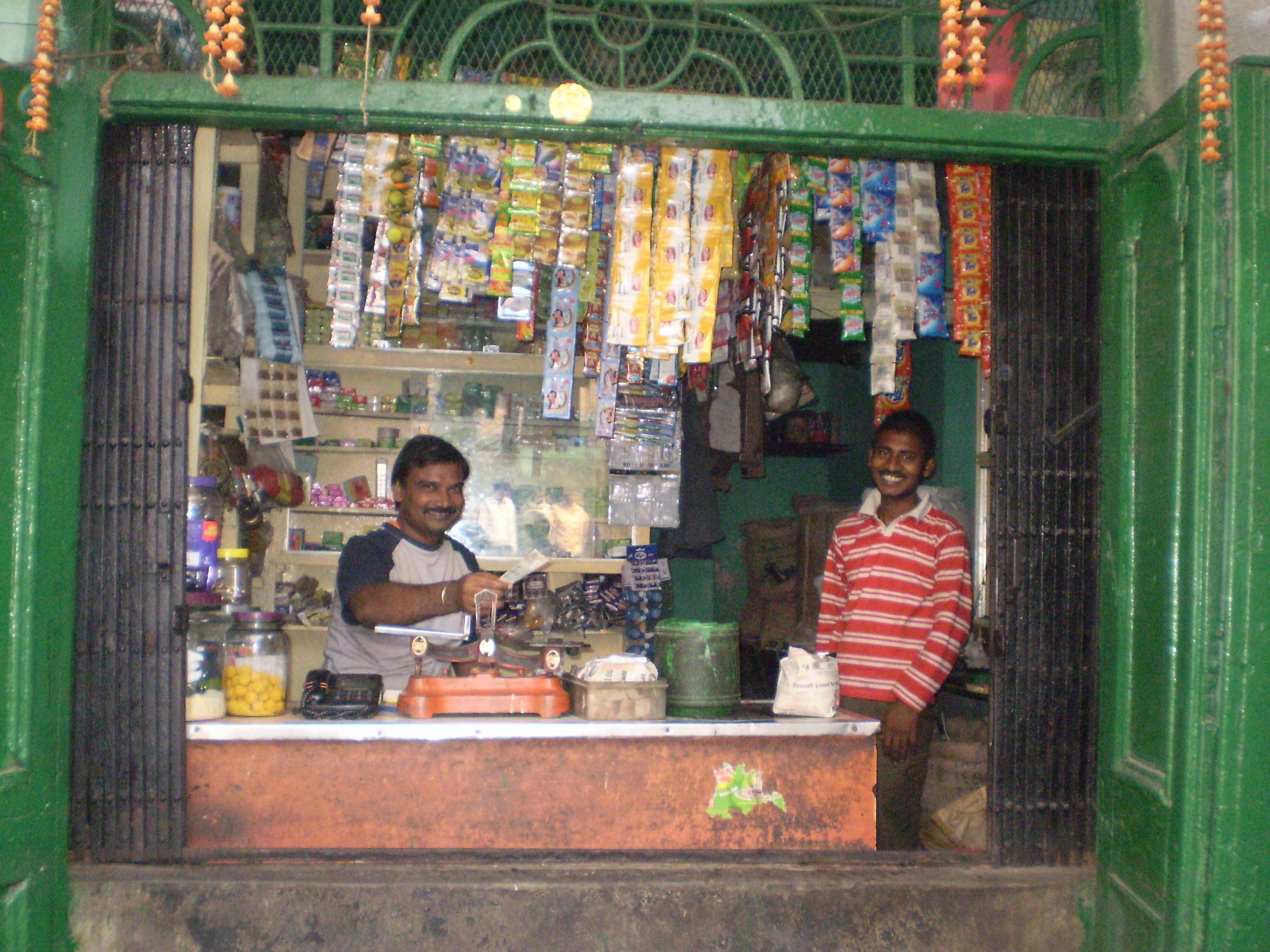
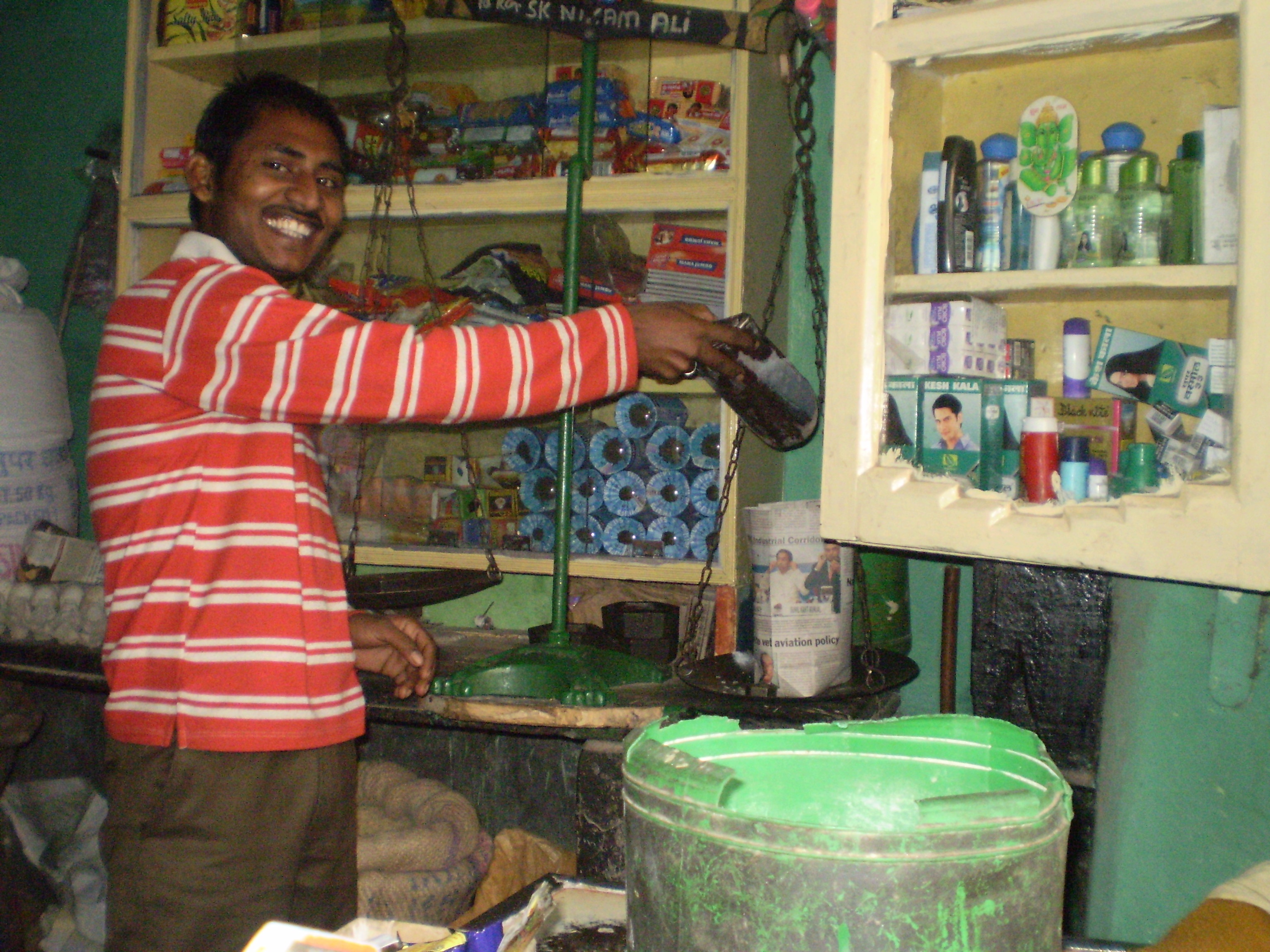
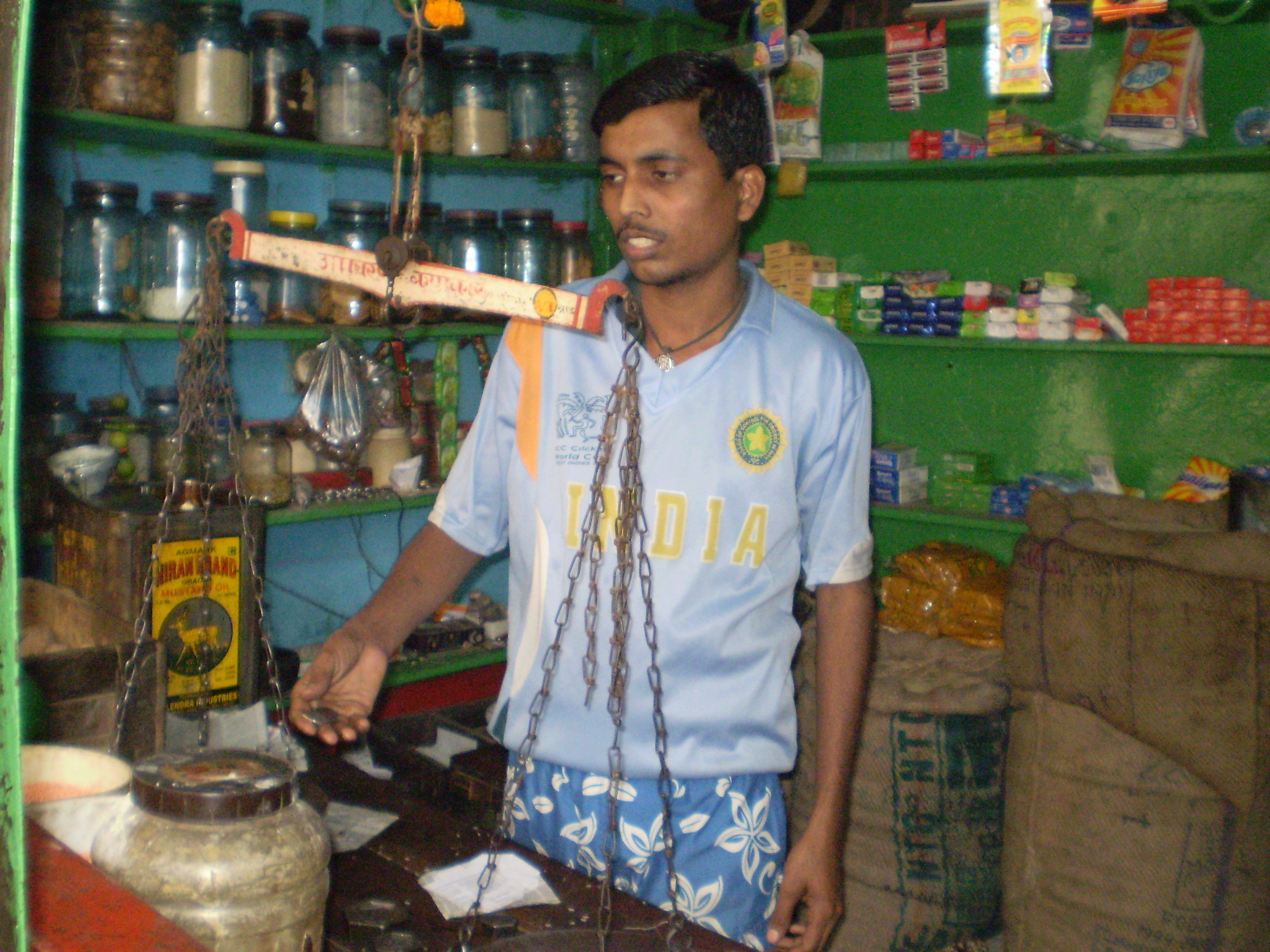
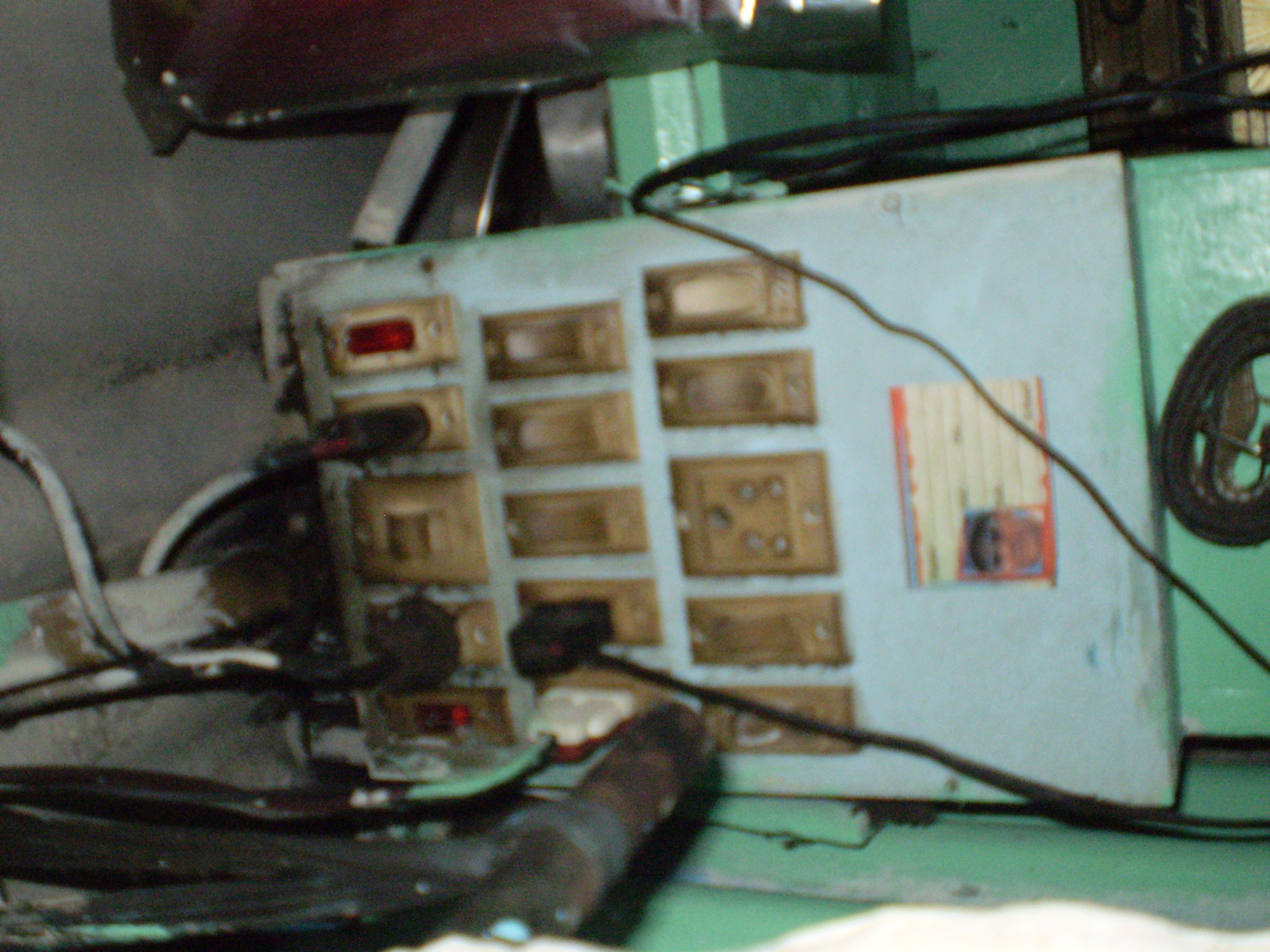
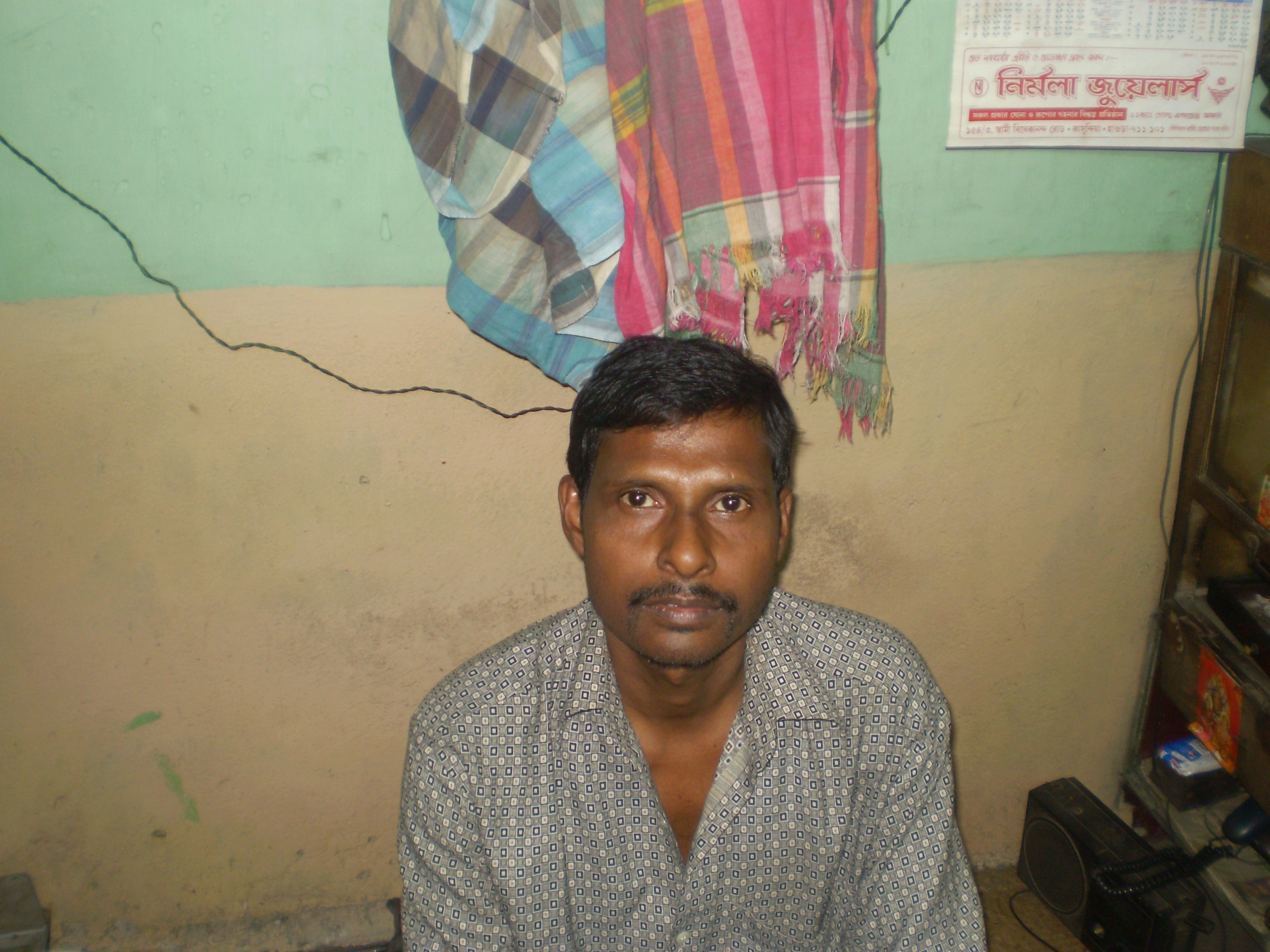
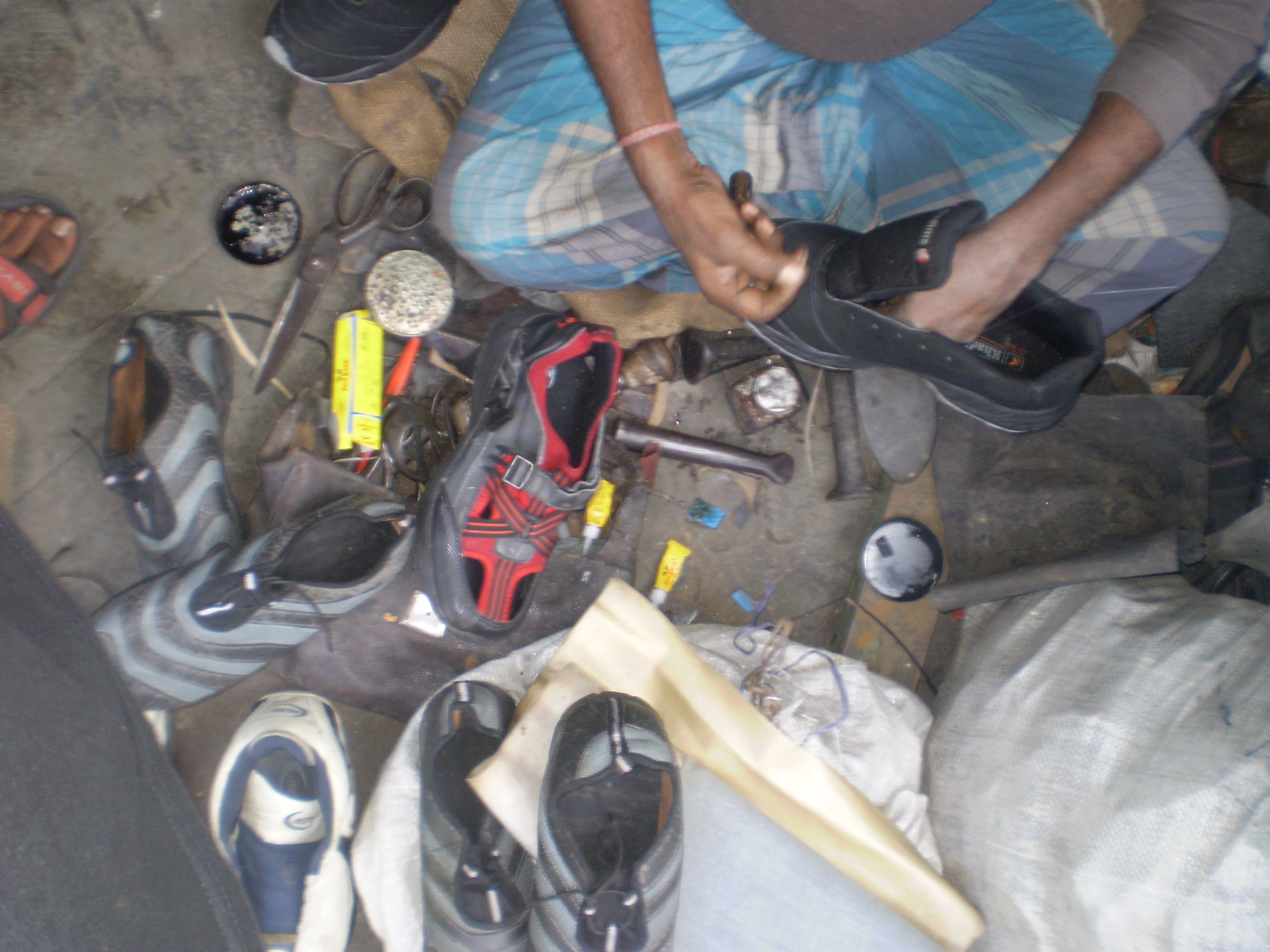
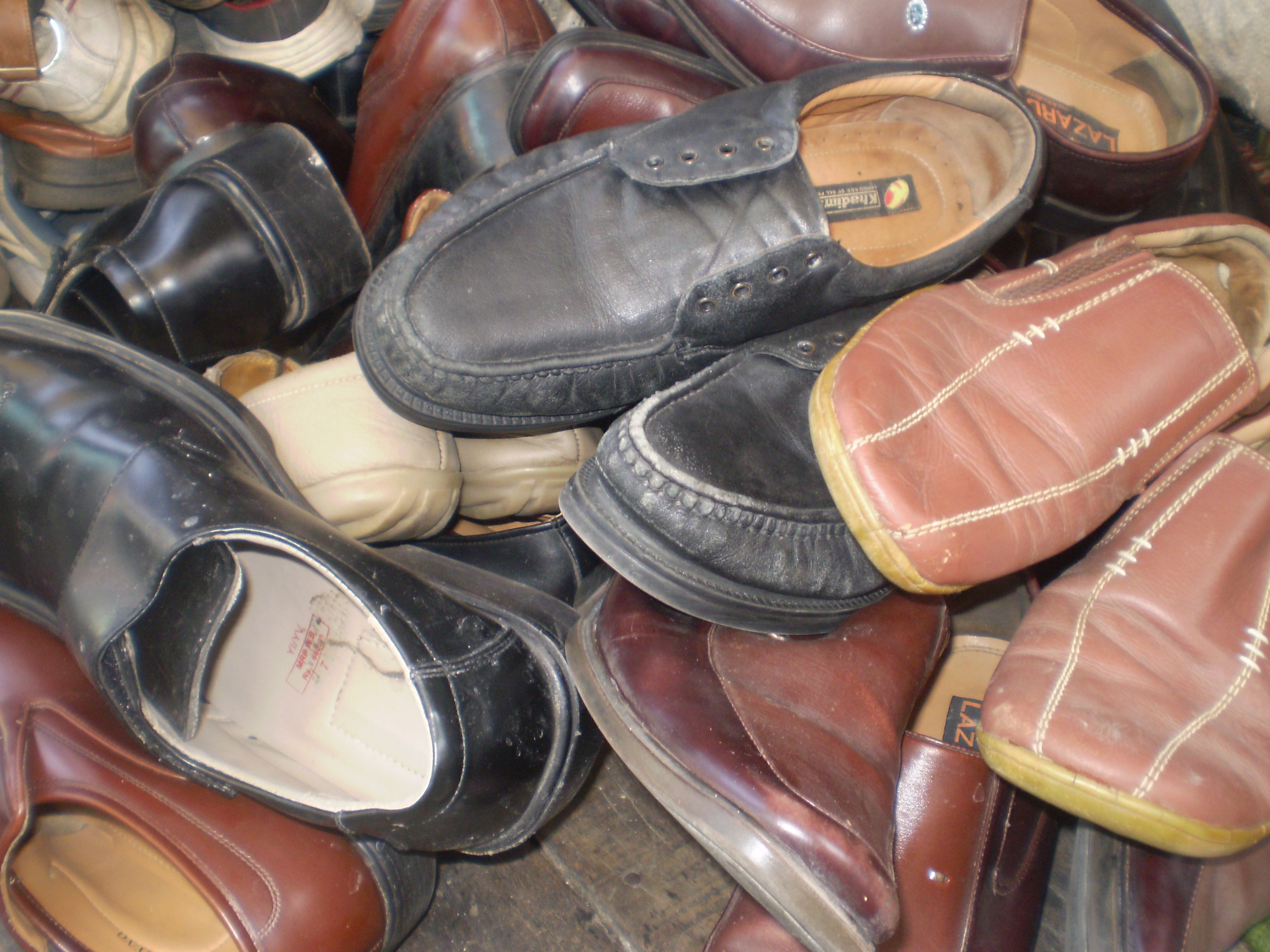

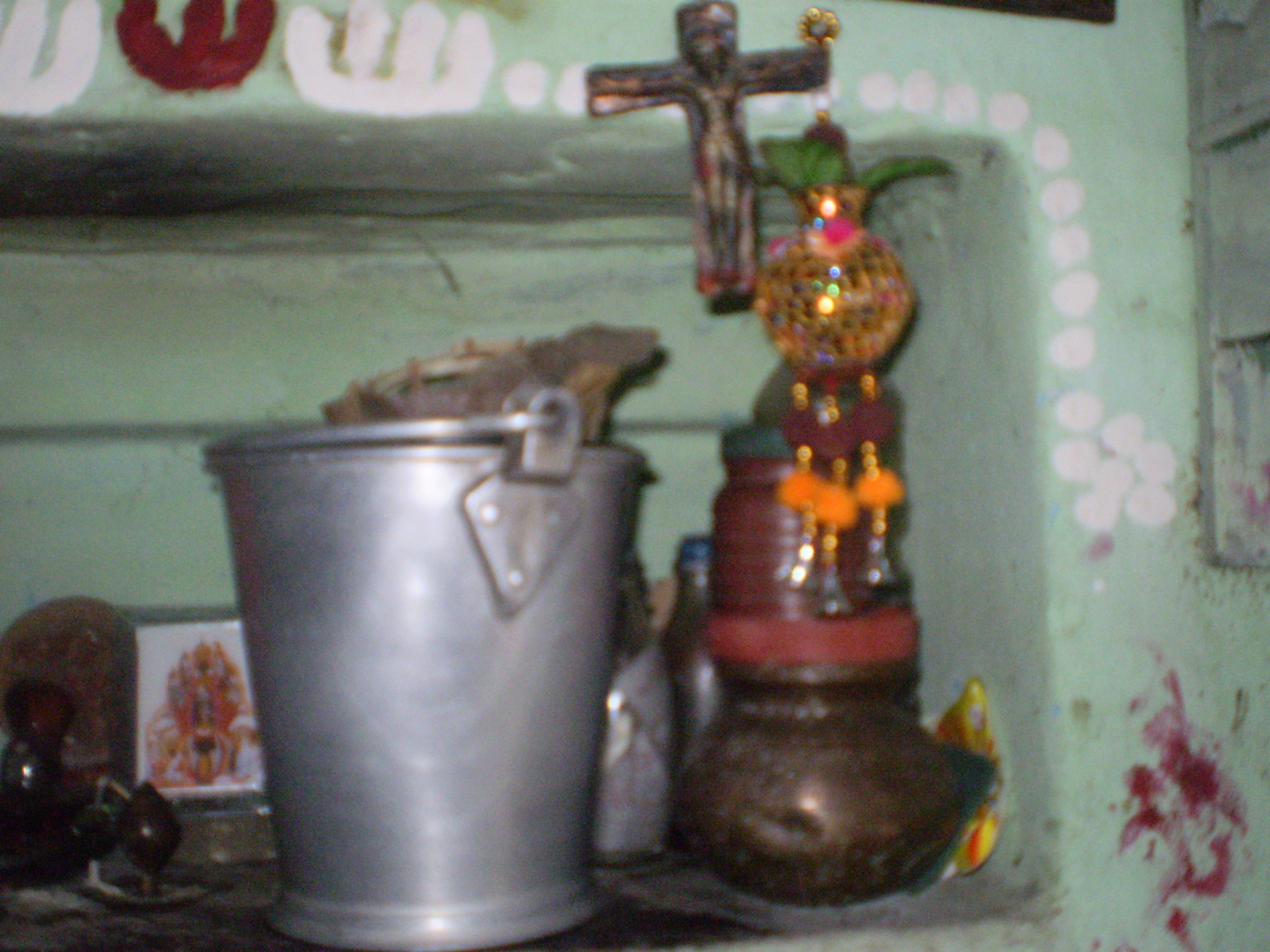
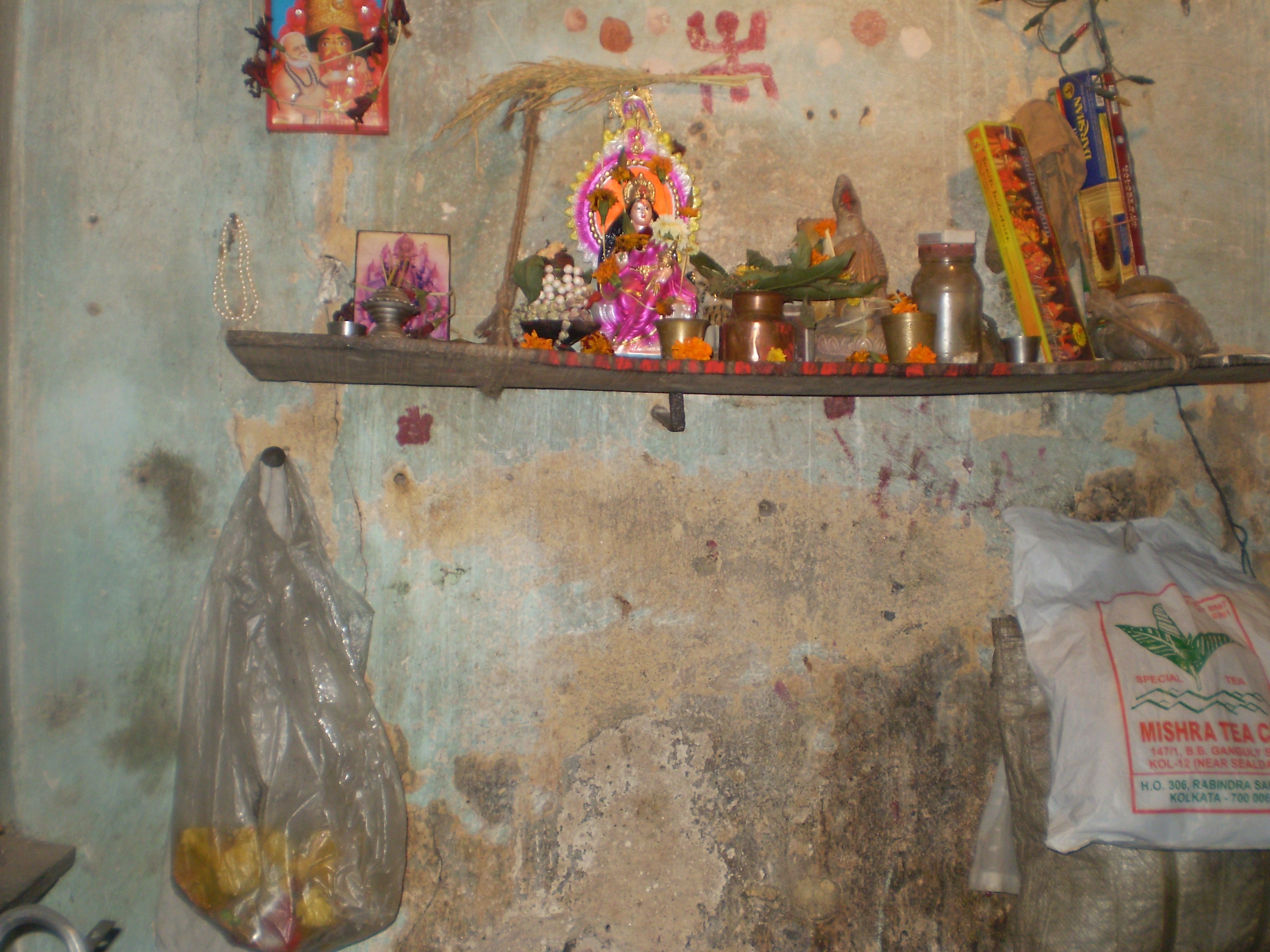
These are very vivid descriptions, which offer paint a stunning and colorful portrait of the community. I’m really looking forward to when the participants will be able to publish these vignettes on their own blogs. Great work!
Pingback: Rising Voices » Neighborhood diaries: Young citizen journalists getting into the act
Pingback: Global Voices ग्लोबल वायसेज़ हिन्दी में » कलकत्ता में नागरिक पत्रकारों का कमाल
Pingback: Neighbourhood Diaries » Blog Archive » Photographs on Bow Bazaar Livelihoods
Thanks for adding the pictures.
One problem with multiple pictures in a blog post is that the page takes more time to load. It can be felt in low-bandwidth situations. Any image optimizer or photo editor can be used to reduce the size of the image before posting so that the page loads faster.
The pictures speak for themselves , the journalists are doing a great job. The one with the the shoe make hands is very interesting , no interpretation, just reality.
Great work!
Joan, Foko
Pingback: (fr) Le projet Neighbourhood Diaries
Pingback: Rising Voices » Neighbourhood Diaries: Training Citizen Journalists in Calcutta’s Marginalized Communities
Hi, my grandfather was from Calcutta, he migrated from India to the Caribbean almost a century ago. We never knew any person from his family so I always wondered if there were any Mondols left. Is this a very common lastname in India or are you all related? Regards, Tania.